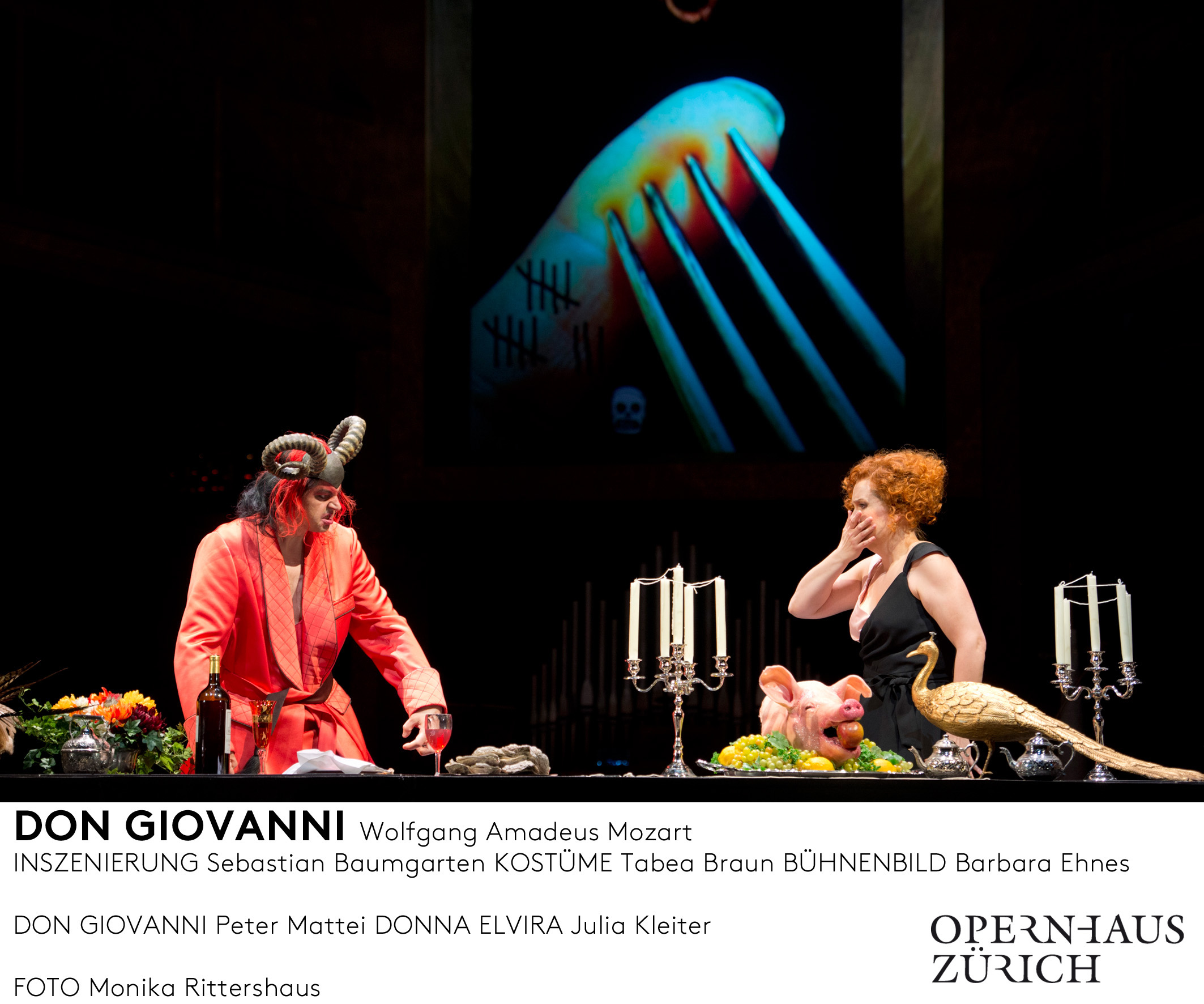
Zurich sidesteps the opera ‘crisis’

With the opera world facing diminishing audiences and financial woes, Zurich Opera appears to be bucking the trend. Rated the world’s best opera house, can its success continue?
There is a palpable air of anticipation and excitement among the opera house staff. It is mid-June and there are only a few days to go before Zurich Opera’sExternal link first-ever public opera screening: a live transmission of Verdi’s Rigoletto onto a huge screen in the square in front of the building.
On stage, overlooking the opulent red and gold interior of the opera house, it is business as usual. Technicians – men, but also a few women – with electric screwdrivers and muscle power at the ready are preparing for the normal evening performance of Rigoletto.
“It’s a very modern production in terms of stage design,” says stage manager Marc Linke. “Normally Rigoletto is more of an extravaganza type of set and here it’s a big black room with a big white table around which the actors do their acting.”
Linke finds the challenges of mounting many new productions, where the artistic demands are high, exciting. Everyone, “down to the last stage technician”, is proud to work at the opera, he said
That there is a good working atmosphere at the opera house is confirmed by two of its visiting stars. George Petean, the big Romanian baritone playing the titular Rigoletto – his dream role – described the opera house as “one of the more important places where opera is made”.
His on-stage daughter, Gilda, played by Polish soprano Aleksandra Kurzak, agreed. Sitting in curlers in her dressing room, and cool as a cucumber before her evening performance, she added that “everything is organised very well, as we say in Poland, like a Swiss clock”. She in particular relishes the production’s modern approach to the staging.
The live transmission on June 21, in which both singers participated, attracted around 10,000 viewers.

More
Taking opera out of the opera house
More than stars
Back in April, Zurich Opera beat off New York’s Metropolitan Opera and Covent Garden in London to win Opera House of the Year at the International Opera AwardsExternal link.
“…We felt that Zurich Opera stood out for being a house that is home to some of the biggest stars yet also an artistic institution revitalised by its new Intendant Andreas Homoki,” John Allison, editor of Opera Magazine and co-founder of the globally nominated awards, told swissinfo.ch in an email comment.
The new general director took over two years ago from Alexander Pereira, who left for the Salzburg Festival after 21 years in Zurich. Before that, Homoki enjoyed a distinguished career as an opera director and manager, having headed Berlin’s Komische Oper for ten years.
Theatrical credibility is very important to him, the German told swissinfo.ch from his office at the back of the opera house.
“We have to go for new audiences, we have to constantly prove that opera is something contemporary and something that is important to our society, even if the pieces that we play may not be from our time,” he explained.
This is why he has been trying to open up the opera house, not only to the public with the live broadcast, but also towards children, with specially tailored operas, and to people on lower incomes through concessions for selected shows.
New team
“The new team has come with very many new and original ideas and has pretty much, in its second year, received the Opera Company of the Year award for this,” said Reinmar Wagner, a journalist at the Musik&TheaterExternal link magazine.
Homoki has brought in new singers, conductors, and directors, drawing in particular here on his knowledge of the scene. He has also reduced the number of annual opera productions from 12-14 to nine.
“But that doesn’t mean that they should rest on their laurels,” Wagner said. “We don’t know how the situation will develop in the future. But it is a good award for the opera house and the Swiss musical landscape and it reflects on Alexander Pereira as well because he made the opera house big and important.”
Indeed, of nine opera houses in Switzerland, only Zurich Opera operates in the upper league, Wagner confirmed. Of the others, the Grand Théâtre de Genève and Theater Basel also have good reputations. There are also many summer opera festivals.
The Swiss are not more opera-loving than their neighbours. But where they do stand out is in how much they are prepared to pay, said Wagner.
“In Zurich a ticket can easily cost CHF300 ($337). People can pay it and do so because it is considered to be part of high society to be seen at an opera premiere in Zurich.”
Opera’s problems
Swiss opera houses are also largely unaffected by the problems facing other countries, such as Italy, Germany and the United States, including the Met Opera, which have all seen falling audience numbers and opera houses – which are expensive to run – shutting their doors, facing bankruptcy or relying increasingly on co-productions.
Switzerland’s better economic situation means that its opera houses still enjoy good private and public funding, Wagner said. Zurich Opera benefits from an around CHF80 million subsidy from the canton of Zurich. Both the Grand Théâtre de Genève and Theater Basel have public funds.
But Zurich Opera still needs to generate 36% of its own income, including from sponsoring, to cover its full costs, according to Homoki. Despite reducing the number of productions – and sponsoring potential, which caused some rumblings – the company broke even financially last year.
Homoki said this second season also boded well financially. Plans for the future include more new works – including his own production of Lohengrin –and introducing subtitles into the seats, as done in Berlin.
“We are constantly going forward,” Homoki said. “Once you stop changing or developing you should also stop doing the job, because you are only good if you are still improving and changing.”
Swiss opera scene
There are nine theatres that offer opera in Switzerland. They have varying systems. Geneva (with ballet) and Lausanne operate in the French-speaking part and do not do classic theatre. Zurich is the only real opera house with opera and dance in the German-speaking region. The others, in Basel, Bern, Lucerne, St Gallen, and an association between Biel and Solothurn, offer opera, dance and theatre. Italian-speaking Ticino has no opera house and Graubünden has three opera festivals in summer. Theater Basel was voted Opera House of the Year in 2010 and 2009 by critics in a survey carried out by the German journal Opernwelt of the German-speaking opera world.
(Source: Reinmar Wagner)
A little bit of history
The Opera House was first known as the Actien-Theater (shares theatre), having been established in 1834 as a joint stock company by theatre-loving citizens. The joint stock company, now known as Opernhaus Zürich AG, still runs the institution. Since 1995, the canton of Zurich has provided the main funding.
The old theatre burnt down in 1890 and was replaced by new neo-baroque building a year later. It was the first opera house in Europe to have electrical lighting. German conductor Wilhelm Furtwängler started his career there, and Richard Wagner’s Parsifal was performed here in 1913 – the first time it had ever been performed outside Bayreuth. Other famous names to have made their appearance: conductor Nikolaus Harnoncourt, as well as singing stars Cecilia Bartoli (who lives near Zurich), Bryn Terfel, Anna Netrebko and Jonas Kaufmann.
The Opera House also has its own ballet ensemble, with around 50 dancers, known as Ballett Zurich. It also holds concerts by its Philharmonia orchestra, matinees, Lieder evenings and events for children. Each year there is an Opera Ball in March, attended by prominent names.

In compliance with the JTI standards
More: SWI swissinfo.ch certified by the Journalism Trust Initiative































You can find an overview of ongoing debates with our journalists here . Please join us!
If you want to start a conversation about a topic raised in this article or want to report factual errors, email us at english@swissinfo.ch.